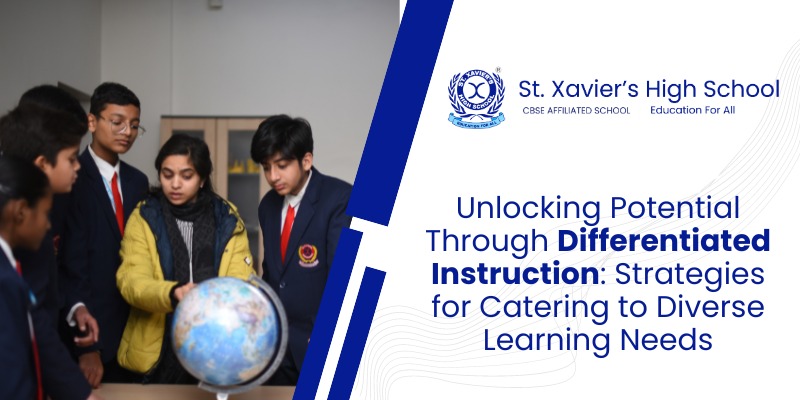Introduction:
As One of the Best 10 Schools in Noida, St. Xavier’s High School is dedicated to providing a nurturing and inclusive learning environment where every student can thrive. Recognizing that students have diverse learning needs, abilities, and interests, the school employs differentiated instruction strategies to unlock each student’s potential and promote academic success. Through personalized learning experiences, targeted interventions, and innovative teaching practices, the School ensures that every student receives the support and resources they need to reach their full potential.
Understanding Differentiated Instruction
Differentiated instruction is an approach to teaching and learning that recognizes and accommodates the diverse learning needs and abilities of students. It involves tailoring instruction, content, and assessment to meet the individual needs, interests, and learning styles of each student, thereby maximizing their engagement and achievement.
At School, differentiated instruction is embedded within the school’s pedagogical philosophy, guiding principles, and teaching practices. Teachers strive to create flexible learning environments where students have opportunities to learn at their own pace, explore their interests, and demonstrate their understanding in ways that are meaningful and relevant to them.
Personalized Learning Experiences
One of the key principles of differentiated instruction at School is the provision of personalized learning experiences that cater to the unique needs and interests of each student. Teachers employ a variety of instructional strategies, materials, and resources to differentiate instruction and accommodate diverse learning preferences.
For example, in a mixed-ability classroom, teachers may use tiered assignments, flexible grouping, and individualized learning contracts to provide students with options and choices that align with their learning goals and preferences. Additionally, teachers utilize technology-enhanced learning platforms, adaptive software, and multimedia resources to create interactive and engaging learning experiences that cater to diverse learning styles and preferences.
Targeted Interventions and Support
In addition to personalized learning experiences, the School provides targeted interventions and support to students who may require additional assistance or enrichment. Through ongoing assessment and data analysis, teachers identify students’ strengths, areas for growth, and learning gaps, and design interventions to address their specific needs.
These interventions may include small-group instruction, one-on-one tutoring, peer mentoring, and academic support services provided by specialized educators or learning support professionals. Furthermore, the school offers enrichment opportunities, advanced coursework, and extracurricular activities to challenge and extend the learning of high-achieving students.
Flexible Instructional Strategies
Differentiated instruction at the School encompasses a range of flexible instructional strategies that accommodate diverse learning needs and preferences. Teachers employ a variety of instructional methods, including direct instruction, cooperative learning, inquiry-based learning, project-based learning, and flipped classroom models, to engage students and promote deeper understanding.
Moreover, teachers provide multiple means of representation, expression, and engagement to ensure that all students have access to the curriculum and can demonstrate their learning effectively. This may involve using visual aids, graphic organizers, manipulatives, multimedia presentations, and alternative assessments to accommodate different learning styles and preferences.
Collaborative Learning Communities
The School fosters collaborative learning communities where teachers, students, parents, and support staff work together to support student learning and achievement. Teachers collaborate with their colleagues to share best practices, co-plan lessons, and develop interdisciplinary units that integrate multiple subject areas and learning objectives.
Furthermore, the school encourages open communication and partnership between teachers and parents, providing opportunities for regular feedback, parent-teacher conferences, and home-school collaboration. By involving parents as partners in the educational process, the School also ensures that students receive consistent support and reinforcement of learning goals and expectations.
Student-Centered Learning
At School, differentiated instruction is grounded in the principles of student-centered learning, where students are active participants in their own learning process. Teachers act as facilitators, guiding students in setting learning goals, monitoring their progress, and reflecting on their learning experiences. This student-centered approach fosters autonomy, self-regulation, and intrinsic motivation among students, empowering them to take ownership of their learning and pursue areas of interest and passion.
Assessment for Learning
Differentiated instruction at the School is supported by ongoing assessment practices that inform instructional decision-making and provide valuable feedback to students. Teachers use a variety of formative assessment strategies, such as quizzes, exit tickets, observations, and performance tasks, to gauge student understanding, identify learning needs, and adjust instruction accordingly.
Inclusive Practices
The School is committed to creating an inclusive learning environment where all students, regardless of their background, abilities, or learning styles, feel valued and supported. Teachers employ inclusive instructional practices that accommodate diverse learning needs, cultural backgrounds, and linguistic abilities, ensuring that every student has equitable access to learning opportunities and resources.
Inclusive practices may include providing multilingual materials, offering differentiated assignments and assessments, implementing Universal Design for Learning (UDL) principles, and fostering a culture of respect, empathy, and understanding among students. By embracing diversity and promoting inclusion, the School celebrates the unique strengths and contributions of each student and fosters a sense of belonging within the school community.
Conclusion:
St. Xavier’s High School is committed to unlocking the potential of every student through differentiated instruction strategies that cater to diverse learning needs and abilities. By providing personalized learning experiences, targeted interventions, flexible instructional strategies, and collaborative learning communities, the school empowers every student to succeed academically, socially, and emotionally.
As One of the Top 10 Schools in Noida, St. Xavier’s High School remains dedicated to providing a supportive and inclusive learning environment where every student feels valued, respected, and empowered to reach their full potential. By embracing differentiated instruction and catering to the unique needs and interests of each student, the school prepares students to thrive in an ever-changing world and become lifelong learners who are equipped to succeed in college, careers, and beyond.

